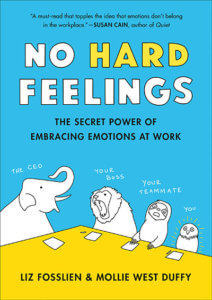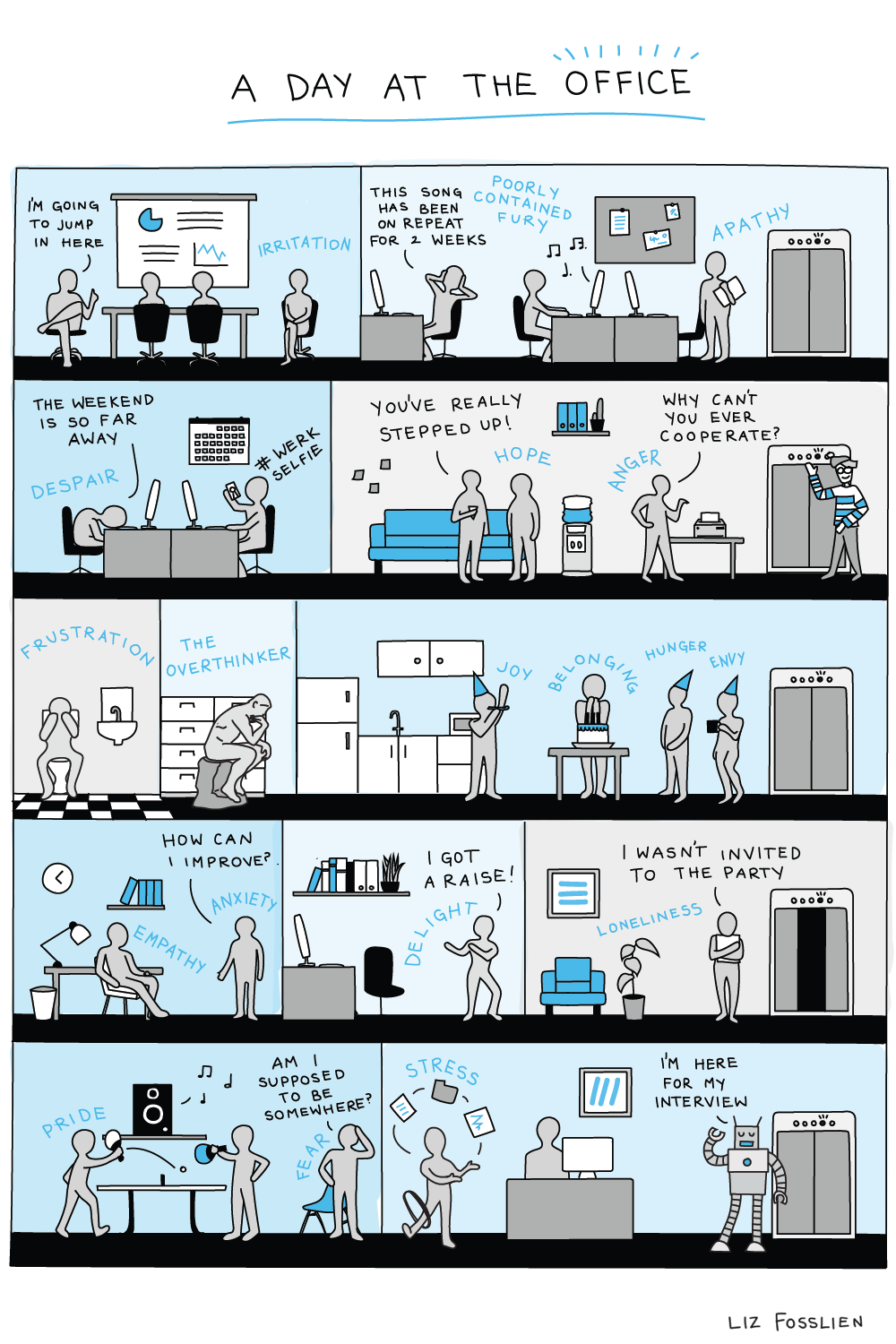When organizational consultants and friends Liz Fosslien and Mollie West Duffy set out to write No Hard Feelings: The Secret Power of Embracing Emotions at Work, they wanted to help people navigate the modern workplace, which they say can be an emotional minefield.
“Our goal with this book,” they write, “is to teach you how to figure out which emotions to toss, which to keep to yourself, and which to express in order to be both happier and more effective.”
If being more human, authentic, and emotionally centered is important in today’s workplace, what does that tell us about the future of work? Co-author Liz Fosslien shared her thoughts on that with Convene.

Liz Fosslien
Do you think being emotionally intelligent will be more of a strength in the future?
I think the book arose because we saw a few specific things that had changed about the workplace in the last 30 years, and I think those things will just continue to intensify. One is the emergence of widely distributed teams. You’re no longer just working with someone who’s sitting next to you. You’re now working with someone in Japan or on the West Coast or on the East Coast. With digital communication — because we’ve removed so many of the non-verbal [cues] — I feel like you have to be incredibly emotionally intelligent to make sure that you’re not accidentally causing anxiety or bulldozing over someone’s feelings. Second, we have seen some jobs be displaced or be automated. That signals to me that the future of the workplace is going to be much more about human collaboration and around the creative elements that are much harder to automate. Of course, it’s nice is that the real routine stuff can be taken off of our plate. If there’s something you’re doing — you’re just hitting the same keys or just moving something from one spreadsheet to another, over and over again, you just shouldn’t be doing that. Engineering can come up with a way to have that done for you and then you can concentrate on the more high-level, strategic parts of your job.
What else do you think is going to become more important in the workplace?
Communication. Even if you’re in the same work- place as someone else, you need to be able to communicate effectively. You need to be able to nip small issues in the bud before they turn into these long-standing, festering feuds that end up tanking your entire team project. Communication is especially important considering that the workforce will be more diverse.
Different people are different — different people, different processes. As we collaborate with more people, we’re seeing that the workplace is becoming much more diverse across every metric. We’re collaborating with people who come from very different backgrounds or have a different framework or context. If you’re working with someone who comes from a totally different culture, that culture might have really different forms of emotional expression. If you’re unaware of that, if you’re unable to talk through that, you might incorrectly assume that someone is being very brusque or thinks poorly of you, when in fact it’s just a cultural difference.
 If embracing our emotions at work will become increasingly important, how do you create safe spaces for people to do that at events?
If embracing our emotions at work will become increasingly important, how do you create safe spaces for people to do that at events?
Yeah. That’s fascinating. I think one thing is to create some kind of structure in a social setting that prompts people to have deeper discussions. I think if you just kind of have a networking event, [there has to be an understanding that] not everyone feels the same level of comfort in sharing personal things, especially if they feel very different than everyone else in the room — it’s harder for them to be vulnerable or to be so open about their life.
I think starting off with some kind of human question that’s also equitable is a good idea. So one of the ones we recommend in the books is: “Let’s have everyone informally get out of their seats, find a partner that you don’t know, and then each answer the question, What was your favorite meal growing up?” And those are the questions they actually ask at BlackRock in their diversity and inclusion sessions and the reason that they ask it is everyone has to eat, and everyone [has memories] of eating meals when growing up. But usually there’s something very tribal almost, about making bread together. People usually don’t just say “pizza,” they say, “Oh, my grandmother used to make this amazing pizza, and I’m now making it with my family.” And, so it’s a really nice way of people being able to share as much or as little as they want to share. But it’s also not, I mean, this is the worst example, but it’s not like, “Which golf club do you belong to?” [laughs] — which some people cannot answer.
Just starting out with getting people comfortable with that, you’re signaling, this is a different type of event, we really value you feeling willing to share. Since introverts especially have a really hard time — it feels much less natural for them to speak up, especially when there’s a huge group and everyone’s jumping in — breaking people up into pairs is a really nice way of just fostering a sense of community. But also makes it way less intimidating to talk — it’s easier for them to open up in that setting.
Michelle Russell is Convene editor in chief.
More from Liz Fosslien

Co-author Liz Fosslien’s whimsical illustrations appear throughout the book, No Hard Feelings, and help to universalize the workplace experience.
CMP Series Required Reading
Once you’ve finished reading the articles linked below, go to Human Intelligence At Work for instructions on how you can earn one hour of CE credit toward the CMP certification from the Events Industry Council.
- Keeping the Future Human
- Will Automation Make Your Job Obsolete?
- You Can’t Automate Care
- In 2017, These Job Skills Topped a Forecast for 2020. How Do They Hold Up?
- Will Automation Put Women Out of Work?
